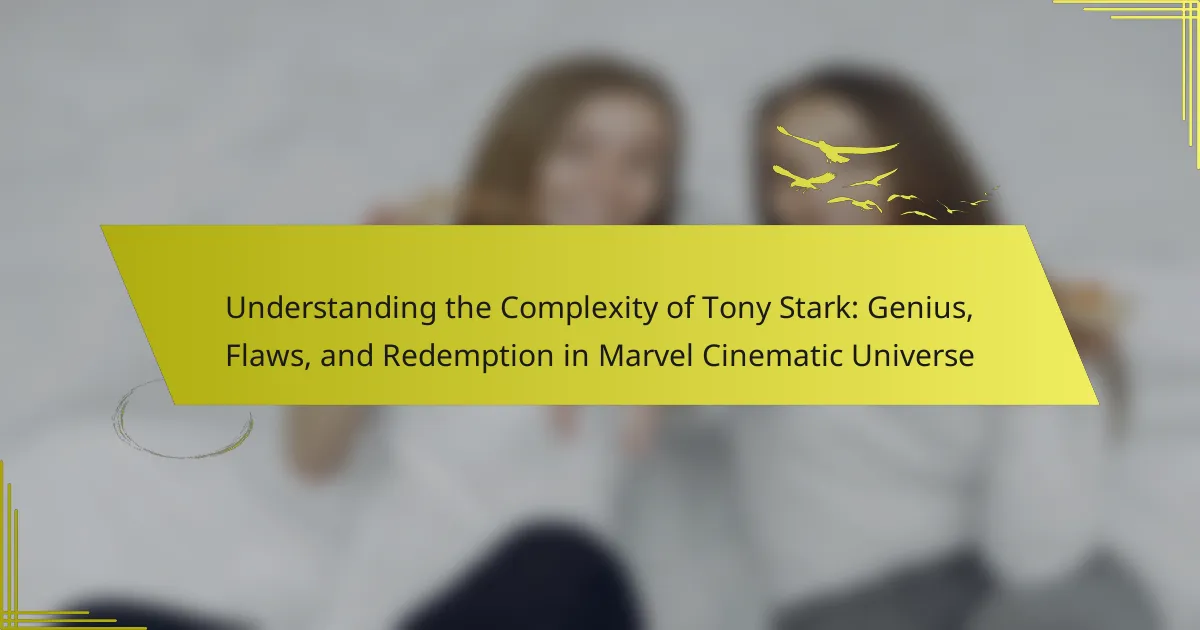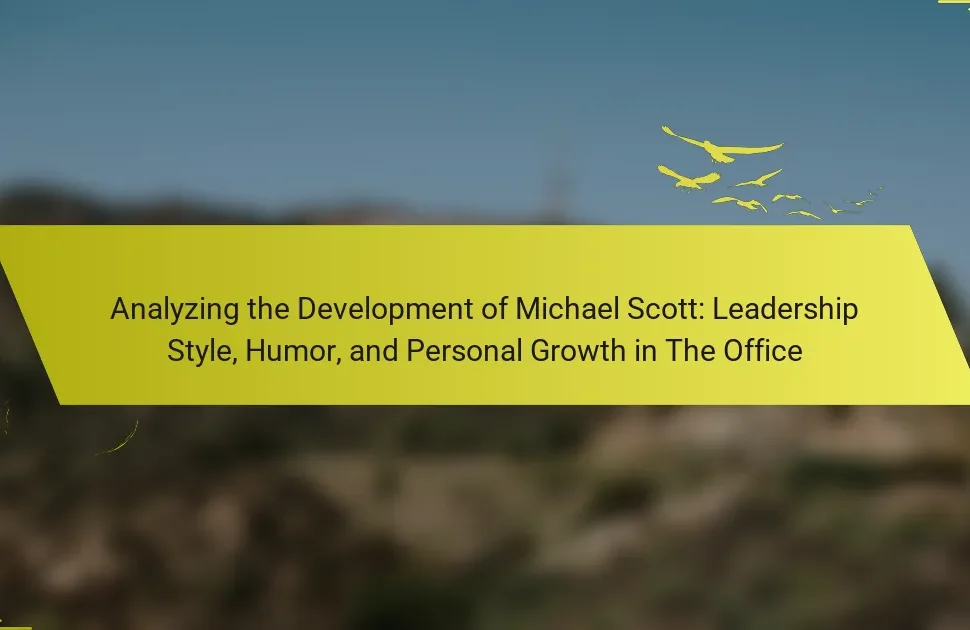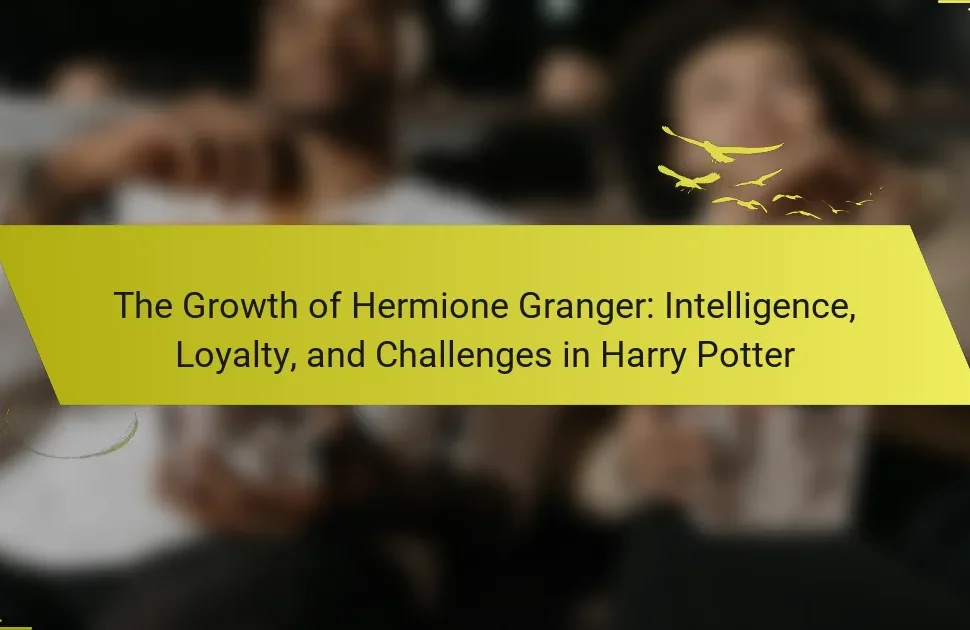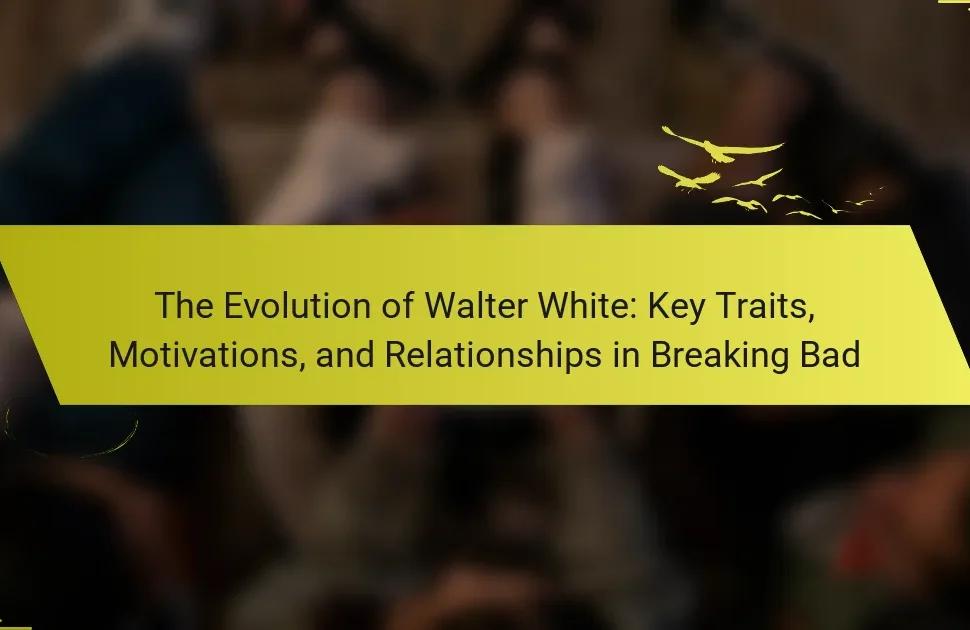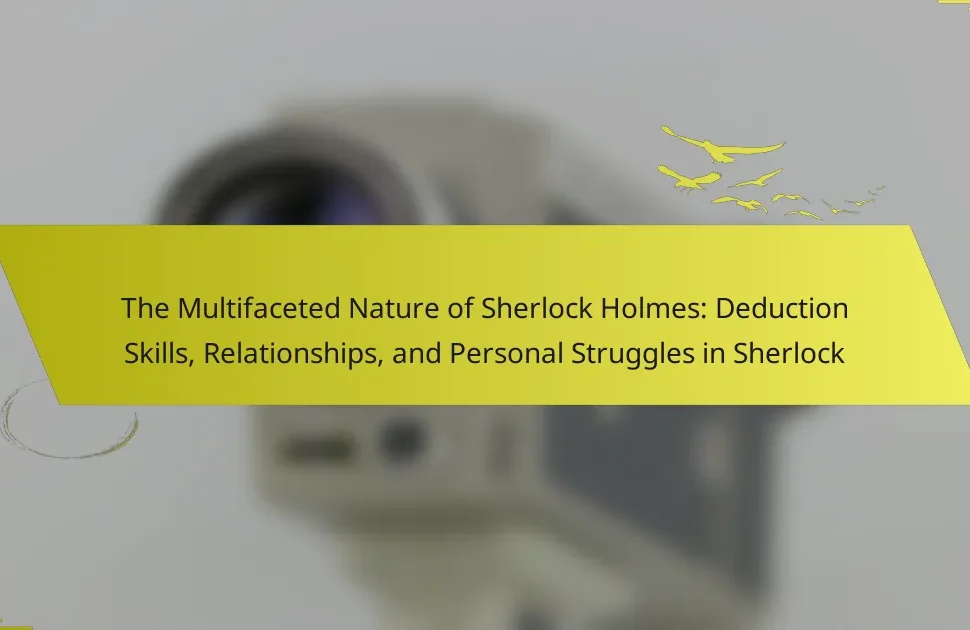Tony Stark, a key character in the Marvel Cinematic Universe, is defined by his genius intellect, personal flaws, and transformative journey toward redemption. The article explores Stark’s evolution from a self-centered arms dealer to a self-sacrificing hero, emphasizing the impact of his relationships with characters like Pepper Potts and James Rhodes on his character development. It highlights the themes of accountability, responsibility, and the duality of human nature, illustrating how Stark’s struggles with his ego and his complex familial relationships shape his actions. Ultimately, the article examines Stark’s narrative as a reflection of personal growth and the significance of connection in achieving redemption.

What makes Tony Stark a complex character in the Marvel Cinematic Universe?
Tony Stark is a complex character due to his genius intellect, personal flaws, and journey toward redemption. His intelligence manifests in his creation of advanced technology and the Iron Man suit. Stark struggles with his ego and arrogance, often leading to reckless decisions. He faces trauma from his parents’ death, which influences his behavior and relationships. His character evolves significantly throughout the Marvel Cinematic Universe. Stark transitions from a self-centered arms dealer to a self-sacrificing hero. This transformation highlights his capacity for growth and change. Ultimately, his complexity lies in the interplay between his brilliance and his vulnerabilities.
How does Tony Stark’s genius manifest throughout the films?
Tony Stark’s genius manifests through his unparalleled technological innovation and strategic thinking. He creates the Iron Man suit, showcasing his engineering expertise. Stark develops advanced artificial intelligence, such as J.A.R.V.I.S., enhancing his capabilities. His quick problem-solving skills are evident during battles, enabling him to adapt to threats. Stark’s inventions, like the Arc Reactor, revolutionize energy sources. He also demonstrates strategic foresight, predicting and preparing for potential threats. His ability to leverage technology for global defense highlights his visionary mindset. Throughout the films, Stark’s genius is a driving force behind the Avengers’ success.
What are the key inventions that showcase his intellect?
The key inventions that showcase Tony Stark’s intellect include the Iron Man suit, the Arc Reactor, and J.A.R.V.I.S. The Iron Man suit revolutionized personal combat technology. It combines advanced materials and artificial intelligence. The suit enhances strength, flight capability, and weaponry. The Arc Reactor provides a clean energy source. It powers Stark’s suit and keeps him alive. J.A.R.V.I.S. is an advanced AI system. It assists Stark in various tasks and decision-making. Each invention demonstrates Stark’s engineering prowess and innovative thinking. These creations have significant impacts on both his personal life and broader conflicts in the Marvel Cinematic Universe.
How does his technological prowess impact his relationships?
Tony Stark’s technological prowess significantly impacts his relationships by creating both distance and connection. His intelligence often leads to misunderstandings with others who may not grasp his innovations. This can alienate him from friends and colleagues. Conversely, his technology serves as a bridge, facilitating communication and collaboration with allies. For instance, his creation of the Iron Man suit allows him to protect those he cares about. However, his obsession with technology can lead to neglect of personal relationships, as seen in his interactions with Pepper Potts. Ultimately, Stark’s technological skills enhance his ability to connect with some while isolating him from others.
What flaws does Tony Stark exhibit in his character arc?
Tony Stark exhibits several flaws in his character arc. He often displays arrogance, believing he is superior to others. This arrogance leads to impulsive decisions, such as creating the Ultron AI without proper oversight. Stark’s struggle with vulnerability is another significant flaw. He frequently masks his insecurities with humor and bravado. His obsession with control results in strained relationships, particularly with his teammates. Additionally, Stark’s initial selfishness drives him to prioritize personal gain over collective responsibility. These flaws contribute to his character development throughout the Marvel Cinematic Universe.
How do his personal insecurities shape his decisions?
Tony Stark’s personal insecurities significantly influence his decisions. His fear of inadequacy drives him to overcompensate through technology and innovation. This manifests in his creation of advanced suits to prove his worth. Stark’s need for validation leads him to take reckless risks, such as confronting powerful adversaries alone. His struggles with self-worth affect his relationships, causing him to push away those who care for him. Additionally, his insecurities about legacy prompt him to seek redemption, ultimately shaping his heroic choices. These patterns highlight how deeply his internal conflicts impact his external actions.
What consequences arise from his arrogance and impulsiveness?
Arrogance and impulsiveness lead to significant consequences for Tony Stark. His arrogance often alienates allies and creates mistrust. This behavior can escalate conflicts, as seen in his strained relationships with other Avengers. Impulsiveness results in hasty decisions that endanger himself and others. For example, his unilateral actions in “Iron Man 2” caused international tensions. Additionally, his impulsive creation of Ultron in “Avengers: Age of Ultron” nearly resulted in global catastrophe. These consequences highlight the destructive impact of his character flaws on both personal and global scales.
In what ways does Tony Stark seek redemption?
Tony Stark seeks redemption through various actions and transformations. He acknowledges the consequences of his past decisions, particularly regarding weapon manufacturing. Stark shifts focus from creating weapons to developing technologies for peace. He actively fights against threats to humanity, exemplified by his role in the Avengers. Stark also sacrifices himself to save others in “Avengers: Endgame.” This ultimate sacrifice represents his commitment to atone for previous mistakes. His journey emphasizes personal growth and the desire to leave a positive legacy.
How does his journey reflect themes of sacrifice and responsibility?
Tony Stark’s journey exemplifies sacrifice and responsibility through his transformation from a self-centered industrialist to a selfless hero. Initially, Stark prioritized personal gain and fame. His experience in captivity led him to recognize the consequences of his actions. He developed a sense of duty to protect others, as seen when he created the Iron Man suit. Stark’s ultimate sacrifice occurs in “Avengers: Endgame,” where he gives his life to save the universe. This act underscores his commitment to responsibility over personal survival. His character arc illustrates the profound impact of embracing sacrifice for the greater good.
What pivotal moments signify his growth and change?
Tony Stark’s growth and change are signified by several pivotal moments. The first moment occurs when he is captured in Afghanistan. This experience leads him to re-evaluate his life and priorities. He creates the first Iron Man suit to escape captivity. This act marks the beginning of his transformation from a self-centered industrialist to a hero.
Another significant moment is his decision to stop manufacturing weapons. This change reflects his newfound sense of responsibility. He makes this decision after realizing the consequences of his inventions. The death of his friend, Yinsen, during captivity profoundly impacts him.
In “The Avengers,” Stark sacrifices himself to save New York City. This act of bravery demonstrates his commitment to the greater good. His character further evolves in “Iron Man 3” when he learns to cope with PTSD. He ultimately decides that he does not need the suit to define himself.
Finally, in “Avengers: Endgame,” Stark’s ultimate sacrifice to defeat Thanos signifies his complete transformation. He goes from a playboy to a selfless hero. Each of these moments showcases his journey of growth and redemption throughout the Marvel Cinematic Universe.
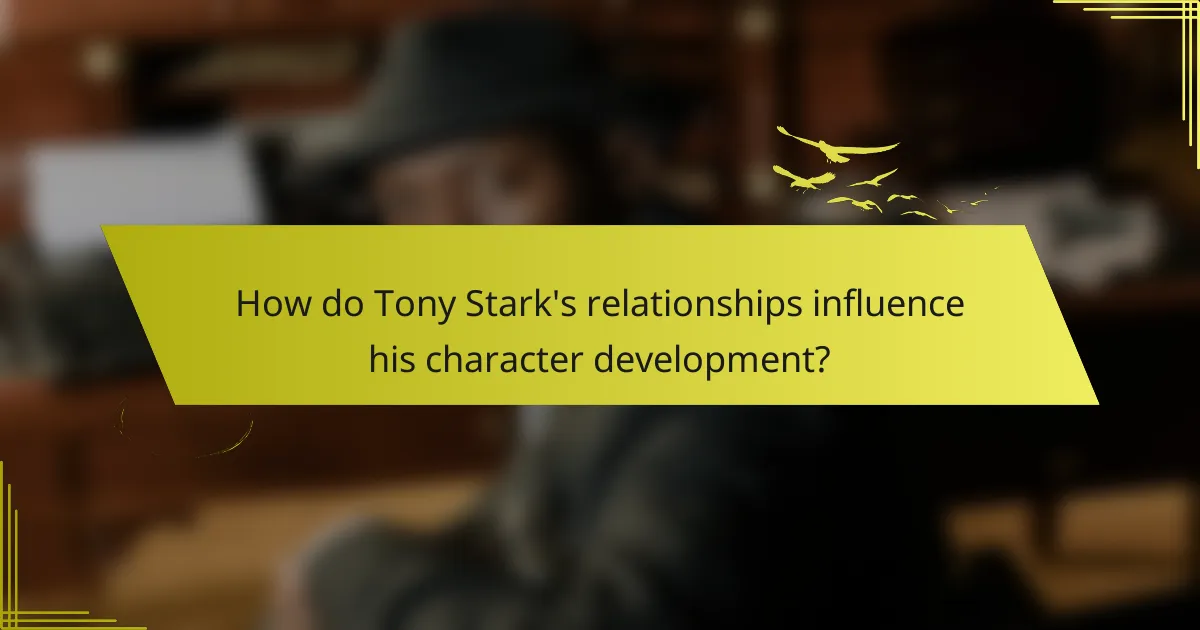
How do Tony Stark’s relationships influence his character development?
Tony Stark’s relationships significantly influence his character development throughout the Marvel Cinematic Universe. His bond with Pepper Potts transforms him from a self-centered billionaire to a more compassionate individual. This relationship grounds him and motivates him to become a better person.
Additionally, Stark’s friendship with James Rhodes provides him with a sense of accountability. Rhodes often challenges Stark’s reckless behavior, pushing him towards responsible decision-making. The mentorship he receives from figures like Nick Fury also plays a crucial role. Fury’s guidance helps Stark navigate his responsibilities as Iron Man and a leader within the Avengers.
Moreover, Stark’s complex relationship with his father, Howard Stark, drives much of his motivation. The desire to prove himself and gain approval from Howard shapes Stark’s actions and decisions. This internal conflict adds depth to his character, showcasing his vulnerabilities.
Ultimately, these relationships are pivotal in Stark’s journey from arrogance to heroism. They highlight his growth and the importance of connection in personal transformation.
What role do his friendships play in his transformation?
Friendships play a crucial role in Tony Stark’s transformation. They provide him with emotional support and accountability. Key friendships, such as those with Pepper Potts and Steve Rogers, influence his decision-making. These relationships challenge his ego and encourage personal growth. For instance, Pepper’s unwavering belief in him inspires Tony to become a better person. Steve’s moral compass pushes him to consider the greater good over personal ambition. This dynamic interplay of friendships helps Tony confront his flaws. Ultimately, his connections with others are integral to his journey towards redemption.
How does his relationship with Pepper Potts evolve?
Tony Stark’s relationship with Pepper Potts evolves from a professional dynamic to a romantic partnership. Initially, Pepper serves as Tony’s assistant, managing his business affairs. Over time, their mutual respect and attraction grow, leading to a romantic relationship. In “Iron Man 2,” they share their first kiss, marking a significant turning point. Their bond strengthens through shared experiences, including battles against villains. In “The Avengers,” Pepper’s support is crucial to Tony’s development. By “Iron Man 3,” they are in a committed relationship, showcasing deep emotional connection. Ultimately, their relationship symbolizes Tony’s journey towards vulnerability and love.
What impact does his bond with James Rhodes have on his choices?
Tony Stark’s bond with James Rhodes significantly influences his choices. This relationship provides Stark with a moral compass and accountability. Rhodes often challenges Stark’s decisions, urging him to consider the consequences. Their friendship fosters a sense of responsibility in Stark. For instance, Rhodes encourages Stark to prioritize the greater good over personal gain. This dynamic is evident in Stark’s eventual decision to join the Avengers. Stark’s choices reflect a desire to protect those he cares about, influenced by Rhodes’ unwavering support. Ultimately, their bond shapes Stark’s evolution from a self-centered genius to a more altruistic hero.
How does his rivalry with Steve Rogers affect his character?
Tony Stark’s rivalry with Steve Rogers profoundly shapes his character. This conflict reveals Stark’s insecurities and need for validation. It drives him to prove his worth as a hero. Their differing ideologies highlight Stark’s struggle between personal ambition and collective responsibility. The rivalry also leads to significant character development for Stark. He learns the value of teamwork and humility through their clashes. This evolution is evident in “Captain America: Civil War,” where Stark’s actions stem from a desire to protect. Ultimately, this rivalry pushes Stark towards redemption, influencing his decisions in later films.
What ideological differences create tension between them?
The ideological differences that create tension between Tony Stark and Steve Rogers are primarily centered on their views regarding freedom and security. Tony Stark advocates for government oversight and regulation of superheroes, believing that accountability is essential for safety. This perspective is rooted in his experience with the consequences of unchecked power, as seen in “Iron Man 3.”
In contrast, Steve Rogers champions individual freedom and autonomy, viewing Stark’s approach as a potential threat to personal liberties. Rogers believes that heroes should operate independently, as highlighted in “Captain America: The Winter Soldier.”
This fundamental clash leads to significant conflict, particularly during the events of “Captain America: Civil War.” Their differing ideologies reflect broader themes of authority versus personal freedom, ultimately showcasing the complexity of their characters and the moral dilemmas they face.
How does their conflict ultimately lead to personal growth for Tony?
Tony Stark’s conflict leads to personal growth by forcing him to confront his flaws. Throughout the Marvel Cinematic Universe, Tony faces external threats and personal challenges. These conflicts reveal his vulnerabilities and insecurities. For instance, his battles against powerful enemies highlight his reliance on technology and ego. This realization prompts Tony to seek deeper connections with others. His relationships with characters like Pepper Potts and Steve Rogers influence his perspective. Ultimately, he learns the value of sacrifice and teamwork. This transformation is evident in his decision to use the Infinity Stones to save the universe. Tony’s journey from arrogance to humility exemplifies significant personal growth.
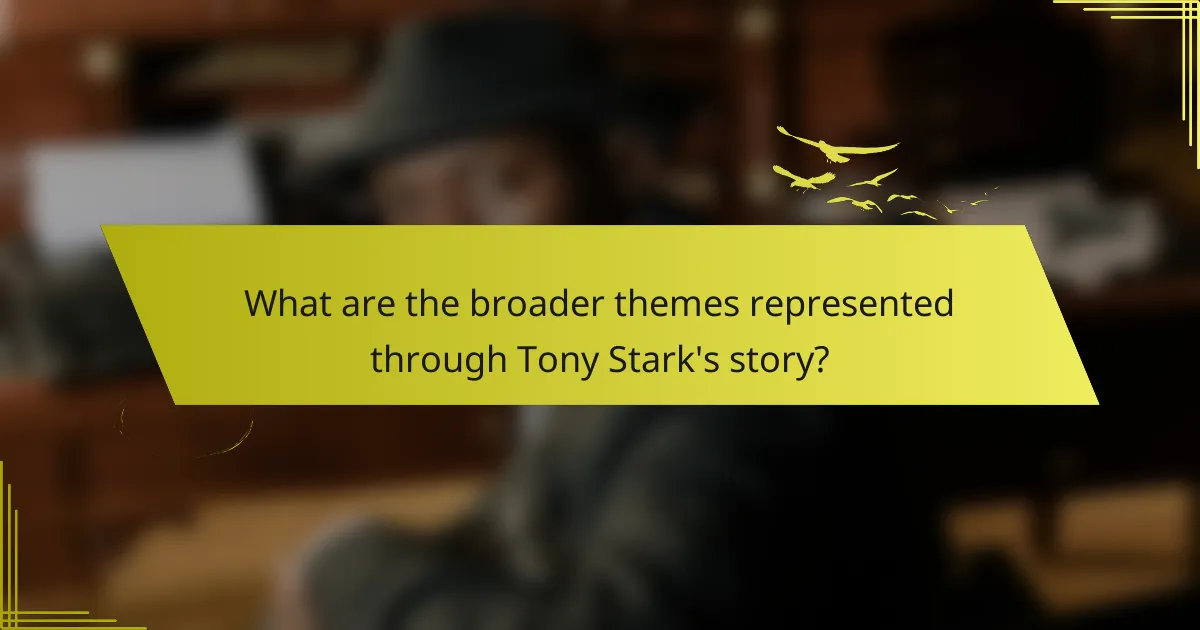
What are the broader themes represented through Tony Stark’s story?
Tony Stark’s story represents broader themes of redemption, responsibility, and the duality of human nature. His journey showcases the transformation from a self-centered industrialist to a self-sacrificing hero. Stark’s initial arrogance leads to catastrophic consequences, illustrating the theme of accountability. The arc of his character emphasizes the struggle between personal flaws and the desire for growth. His relationships, particularly with Pepper Potts and his father, highlight the importance of connection and legacy. Stark’s sacrifices underscore the theme of heroism, where true courage involves putting others before oneself. Ultimately, his story reflects the complexity of human emotions and the capacity for change.
How does Tony Stark embody the concept of the flawed hero?
Tony Stark embodies the concept of the flawed hero through his intelligence, arrogance, and personal struggles. He is a genius inventor and billionaire, which gives him immense power. However, his arrogance often leads to reckless decisions. Stark’s journey reveals deep-seated insecurities and trauma from his past. He battles addiction and guilt over the consequences of his inventions. This complexity makes him relatable and human. His flaws drive his character development throughout the Marvel Cinematic Universe. Ultimately, Stark seeks redemption by sacrificing himself to save others, highlighting his growth from selfishness to selflessness.
What does his character reveal about the nature of heroism?
Tony Stark’s character reveals that heroism is multifaceted and often involves personal sacrifice. He embodies the struggle between ego and altruism. Stark’s journey illustrates that true heroism includes vulnerability and the willingness to confront one’s flaws. His decision to sacrifice himself in “Avengers: Endgame” exemplifies ultimate selflessness. This act highlights the idea that heroes are not infallible but learn from their mistakes. Stark’s growth from a self-centered billionaire to a self-sacrificing hero underscores the transformative nature of heroism. His character challenges the notion that heroes must be perfect, showing that they can also be deeply flawed.
How does his journey reflect societal issues and personal struggles?
Tony Stark’s journey reflects societal issues and personal struggles through his evolution from a self-centered industrialist to a responsible hero. Initially, he embodies corporate greed and the consequences of weapon manufacturing. His kidnapping represents the personal struggle of confronting his own mortality and the impact of his inventions. Stark’s decision to stop producing weapons highlights a societal shift towards ethical responsibility in technology. His battles with PTSD after the events of the Avengers signify the personal toll of heroism and trauma. The character’s growth illustrates the importance of accountability and redemption in a flawed society. Stark’s journey resonates with audiences, showcasing the complexities of human experience in the face of societal expectations.
What lessons can be learned from Tony Stark’s complexity?
Tony Stark’s complexity teaches valuable lessons about the duality of human nature. His brilliance as an inventor is often overshadowed by his personal flaws. Stark’s journey illustrates the importance of humility and accountability. He faces consequences for his arrogance and selfishness. This demonstrates that intelligence alone does not equate to wisdom. Additionally, Stark’s evolution shows the significance of personal growth and redemption. He learns to prioritize others over himself. His character arc emphasizes that vulnerability can lead to strength. Ultimately, Stark’s complexity reflects the multifaceted nature of humanity, highlighting both strengths and weaknesses.
How can his experiences inform our understanding of personal growth?
Tony Stark’s experiences illustrate the multifaceted nature of personal growth. His journey from a self-centered industrialist to a selfless hero highlights the impact of adversity on character development. Stark faces numerous challenges, including loss and failure, which catalyze his transformation. For example, his abduction in Afghanistan leads him to reevaluate his priorities and responsibilities. This pivotal moment sparks his commitment to using technology for good. Additionally, his relationships with other characters, like Pepper Potts and Steve Rogers, further shape his growth. These interactions emphasize the importance of collaboration and emotional vulnerability. Stark’s progression demonstrates that personal growth often stems from confronting one’s flaws and embracing change. His story serves as a compelling reminder that growth is an ongoing process influenced by experiences, relationships, and self-reflection.
What practical insights can we draw from his journey of redemption?
Tony Stark’s journey of redemption provides several practical insights. First, personal growth often stems from acknowledging one’s flaws. Stark faced his past mistakes, which led to significant self-improvement. Second, the importance of accountability is evident. He took responsibility for his actions, demonstrating that owning up to errors fosters trust and respect. Third, collaboration is crucial in overcoming challenges. Stark learned to work with others, highlighting that teamwork enhances problem-solving. Fourth, resilience plays a key role in redemption. Despite setbacks, Stark persisted, illustrating that determination can lead to success. Lastly, the journey emphasizes the value of mentorship. Stark’s relationships with others, such as Peter Parker, show how guiding others can reinforce one’s own growth. These insights collectively underline that redemption involves self-awareness, responsibility, collaboration, resilience, and mentorship.
The main entity of this article is Tony Stark, a character in the Marvel Cinematic Universe known for his genius intellect, personal flaws, and journey toward redemption. The article examines Stark’s technological innovations, such as the Iron Man suit and J.A.R.V.I.S., and their impact on his relationships and character development. It discusses his flaws, including arrogance and impulsiveness, and how they lead to significant consequences. Additionally, the article explores themes of sacrifice, responsibility, and the broader implications of Stark’s journey, highlighting lessons on personal growth and redemption. Overall, it provides a comprehensive analysis of Stark’s complexity as a flawed hero.
